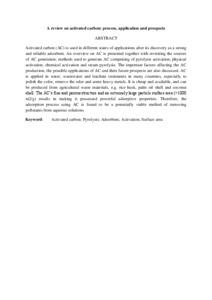Citation
Tadda, M. A. and Ahsan, A. and Shitu, A. and ElSergany, M. and Arunkumar, T. and Jose, Bipin and Razzaque, M. Abdur and Nik Daud, N. N.
(2016)
A review on activated carbon: process, application and prospects.
Journal of Advanced Civil Engineering Practice and Research, 2 (1).
pp. 7-13.
ISSN ESSN: 2550-1933
Abstract
Activated carbon (AC) is used in different states of applications after its discovery as a strong and reliable adsorbent. An overview on AC is presented together with revisiting the sources of AC generation; methods used to generate AC comprising of pyrolysis activation; physical activation; chemical activation and steam pyrolysis. The important factors affecting the AC production, the possible applications of AC and their future prospects are also discussed. AC is applied in water, wastewater and leachate treatments in many countries, especially to polish the color, remove the odor and some heavy metals. It is cheap and available, and can be produced from agricultural waste materials, e.g. rice husk, palm oil shell and coconut shell. The AC’s fine and porous structure and an extremely large particle surface area (>1000 m2/g) results in making it possessed powerful adsorptive properties. Therefore, the adsorption process using AC is found to be a potentially viable method of removing pollutants from aqueous solutions.
Download File
![[img]](http://psasir.upm.edu.my/54918/1.hassmallThumbnailVersion/A%20review%20on%20activated%20carbon%20process%2C%20application%20and%20prospects.pdf)  Preview |
|
Text (Abstract)
A review on activated carbon process, application and prospects.pdf
Download (100kB)
| Preview
|
|
Additional Metadata
Actions (login required)
 |
View Item |

